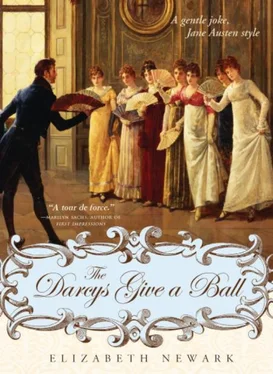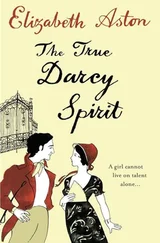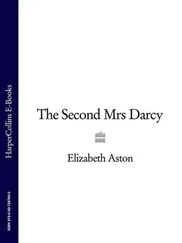“But we must have the Churchills,” went on Juliet. Her dress that day was a deep coral pink, and it was only natural that the color should be reflected in her cheeks.
“Mrs. Churchill is sadly delicate, but a very sweet and gentle lady. Perhaps she will not come. But Francis and Ger- … Gerard,” she finished in a hurry. “I am sure they would be happy to be invited.”
She was looking out of the window and did not see her mother raise her eyebrows at her Aunt Jane.
“Now the Brandons, I believe we should ask the Brandons,” said Jane quickly. “I am so fond of Marianne—I wish we met more often—and Dorothea Brandon is growing into quite a beauty, so they say. And if we invite the Brandons, then I think we must ask Nell Ferrars. The family is well connected, although I believe her father—he is a clergyman—is not at all well off. Nell does not go much into society. (I have heard it may be necessary for her to take a post as a governess!) But she and her cousin are always together.
“And the young Tilneys, Priscilla and Frederick. And the Wentworths—Admiral Wentworth married Anne Elliot, you will recall. The young men are called Alexander and Paul. Alexander, the elder, is in the Navy like his father and doing very well, I believe. I must admit to a weakness for the Navy.
“And speaking of the Elliots, perhaps the Elliot heir? I believe he is seen everywhere; he has a most polished manner, though his mother is not at all the thing,” said Jane.
“He dances very well,” murmured Juliet, a smile playing about her mouth. Although Gerard Churchill was her ideal, she could not help being aware of other men, particularly those who seemed to admire her. Colin Knightley followed her constantly with his eyes (was one reminded slightly of a spaniel, or some larger breed? Retriever? Both the twins were tall). But Colin had no conversation, and no one could take the Musgrove boy seriously. Walter William Elliot was a different matter altogether. She had met him at a ball towards the end of the Season. He was somewhat older than her brother’s friends, and not precisely good-looking, with hair that unusual light red, but he had an air of sophistication that intrigued her.When she met his eyes (and he did seem to look at her quite often; nearly every time she glanced his way, his eyes would be on her), she felt as if she had missed a step—or a heartbeat. She shivered pleasurably, remembering.
“Fitz says Walter Elliot is a cit,” said Elizabeth, frowning at her daughter. “But he certainly has address. And the title is an old one. Did you ever meet Elizabeth Elliot, Jane? She married the Earl of Westchester after the death of his first wife, just a year or two ago. She is herself, of course, no longer in the first blush of youth and he—he must be well over seventy. It was one of the wonders of the year,” she went on.
“Of the two, the doubtful Lady Elliot—Sir William’s wife— and the Countess of Westchester, I must confess I prefer the former.Whatever her origins, she is a very pleasant lady, always eager to converse—while the Countess is so concerned with position that much of her life is taken up in getting in or out of rooms in the correct social order!
“Tom Bertram—he is now Sir Thomas, of course—has two daughters, Claudia and Sophia, who are pretty enough, and I believe the Yates girls, their cousins, were part of your set in town, Juliet? Pamela and Angelica, if I have it right. With our neighbors, that should fill the ballroom! “And now, Jane, we will address the invitation to all members of the Collins family, and we will hope that some of them cannot come.”
“The Collinses? Who are the Collinses?” asked Juliet, idly. “Do I know them?” This ball was, after all, for her, she thought. Her mother and aunt exchanged glances.
“I’m sure you remember, dearest. Mr. Collins inherited Longbourn from your grandpapa. Henry renewed his acquaintance with the family recently on his way home from Oxford. He wishes to return their hospitality by inviting the young people here.”
“Are any of them out? Shall I have met them in Town?”
“They are quiet people, Juliet. I doubt very much if any of the girls have been formally introduced to Society. But they are your second cousins. I hope you will make them welcome.”
“They sound like poor relations,” said Juliet, tossing her head. She remembered now, Henry had made a fuss over a girl he had met returning from Oxford. Collins, that was the name. Juliet did not like talking about other girls, and had discouraged him from rhapsodizing. She dismissed the Collinses from her mind.
On his return to Pemberley from Longbourn, Henry Darcy, Oxford graduate, had tried to analyze his feelings, this sudden overwhelming attraction he felt to Eliza Collins, the odd girl who liked cats and caterpillars, looked at him with a prim mouth and laughing eyes, and encouraged him to talk. He had known her just three days. Her father was pompous and dull, her mother calm and pleasant, her sisters unremarkable. Jonathan, her brother, he liked. The three of them had walked and talked, Henry telling of Oxford, Jonathan of Cambridge, Henry of Keats and Byron and Shelley, and Jonathan of South America and the South Sea Islands, and stag beetles and stick insects, while Eliza danced along beside them and turned over logs and rocks, whereupon she and her brother pored over the skittering inhabitants. It was she who listened and, by some apt question and the deep interest she took in all they had to say, set them off again. She was nothing like Henry’s own sister, or his sister’s friends. She was not self-conscious or coy; she made no attempt to attract. Her voice was clear and musical. In the evenings she and Jonathan sometimes sang duets. But it was her face that caught his eye and held his thoughts. She was small and active, and treated him with a casual friendliness that had changed, he thought and hoped, to something very much warmer before he left. He remembered her shy, wondering gaze at him. Eliza. He let her name sing in his mind. Eliza. A poem showed up in his memory, one his tutor had introduced him to, saying he was becoming too serious in his approach to literature. “Try Sir John Suckling, young Darcy,” Mr. Lydgate had said. “A little robust humor will be just the thing.”
Out upon it! I have loved
Three whole days together;
And am like to love three more,
If it prove fair weather.
Had it any been but she,
And that very face,
There had been at least ere this
A dozen dozen in her place.
That very face, he thought. Eliza.
Chapter Five
The Invitation
“Who could have imagined that we should receive an
invitation...”
“...this invitation is particularly gratifying, because it is what
I have been hoping to receive and you may be very certain
that I shall avail myself of it as soon as possible.”
Jane Austen
The invitation caused a mixture of elation and dismay in the Collins family.
Mr. Collins, who had adapted well to the prim and proper ways that had come into being with the succession to the throne of the young Queen Victoria (he was a great believer in modesty, virtue, and obedience—for women), saw himself as a figure of considerable rectitude and some importance. His many years as a clergyman at Hunsford had endowed him, he considered, with a decided odor of sanctity; his present position as Master of Longbourn, he felt, had added the glossy sheen of landed gentry to his person. And this collected glory was at last being recognized by Lady Catherine de Bourgh’s most aloof relative (he could think of no other reason for the invitation, his first to Pemberley). His triumph in consequence was complete; he was delighted to accept on behalf of them all.
Читать дальше

![Ричард Деминг - Whistle Past the Graveyard [= Give the Girl a Gun]](/books/412176/richard-deming-whistle-past-the-graveyard-give-t-thumb.webp)









